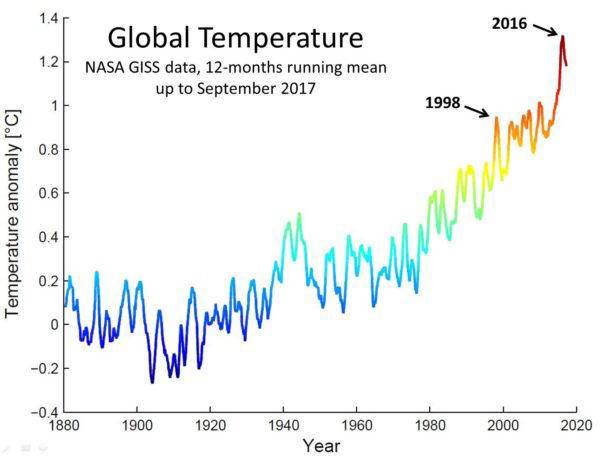By Professor Susanne Becken
 This blog accompanies a video presentation recorded for the World Travel Market Responsible Tourism Day, 6 November 2017. The panel to which the video contributed was entitled: The Major Environmental Challenges: Carbon & Water RTT, and chaired by Mr Christopher Warren, Crystal Creek Meadows, NSW, Australia.
This blog accompanies a video presentation recorded for the World Travel Market Responsible Tourism Day, 6 November 2017. The panel to which the video contributed was entitled: The Major Environmental Challenges: Carbon & Water RTT, and chaired by Mr Christopher Warren, Crystal Creek Meadows, NSW, Australia.
Click here to watch the video:
When reflecting on the last decade of work on climate change and tourism, I can make three observations:
1. The climate is changing faster than predicted

Fig. 1 GISTEMP global temperature data, in 12-months running average (anomalies relative to the first 30 years). Source: http://www.realclimate.org/index.php/archives/2017/11/el-nino-and-the-record-years-1998-and-2016/
Every year we are witnessing new records in climate extremes. The US National Oceanic and Atmospheric Administration maintains several websites to report and visualise climate extremes and anomalies. The Figure on the right, for example, shows a long term trends. Not only are temperatures increasing faster than expected, but so do the rise in sea levels, the intensity of storms, and the retreat of Arctic sea ice.
What does this means for tourism? Very clearly operating in – often vulnerable – locations becomes more costly and riskier. Thus, tourism industry and Government are now forced to get much more involved (and invest!) in adapting to changing conditions. In many cases, adaptation has to respond to negative impacts on assets and attractions. The Great Barrier Reef and recent coral bleaching events is a prominent example.
2. Tourism emissions are growing
We are now consistently measuring atmospheric CO2 concentrations of over 400 parts per million; this is very high and demands rapid decarbonisation and a concerted effort to reach anywhere near net zero emissions by 2050, as demanded through the Paris Agreement.
Whilst global emissions of CO2 have stabilised (somewhat and for now…) the tourism carbon footprint is increasing. We lack detailed monitoring and measurement of tourism emissions, but considering persistent growth of at least 5% per annum, and no major technological breakthroughs, it is highly likely that the share of tourism’s emissions relative to global emissions is increasing.
There is some progress in tourism, but it is incremental. An increasing number of companies engage in Corporate Social Responsibility Reporting and some genuine effort is being made. (Note: the vast majority of business still do not measure or manage their footprint, let alone report on carbon initiatives). However, what is not discussed, even by the leaders in the industry, is business growth and those parts of the operation where impacts are not mitigated. So, for example, an annual sustainability report may mention that a hotel has now replaced all lightbulbs, and maybe changed the chiller of the air conditioning system, but it would not elaborate on the remaining areas that require attention. Often, indeed the absolute footprint might be growing, as gains are simply not enough to compensate for growth.
This is not problematic (after all, Rome wasn’t built in one day, and one has to start somewhere) unless these selective CSR activities are used as a social license to operate and grow tourism. Thus, having a small number of good examples and case studies could possibly be used to legitimise the status quo of what is generally marginal change. Such an approach will definitely not lead to the major reductions and transformations that are required.
3. Increased pressure
There has probably never been as much pressure on tourism, as on other industries, to address environmental impacts and carbon emissions. The Sustainable Development Goals, the Paris Agreement and many other UN-led programs (e.g. 10 YFP) clearly demand more evidence and action for sustainability initiatives.
Carbon reporting has become more front and centre of what businesses have to do; not least because Governments demand disclosure, and because investors increasingly seek to understand the carbon risks associated with their investments. A recent report by GIFT and Amadeus discusses how far the global Travel and Tourism industry is on this journey of carbon reporting. Another initiative, the Global Sustainable Tourism Dashboard, also aims to introduce more rigour into sustainability reporting for tourism globally.
The increasing spotlight on carbon emissions and the need to consider the wider benefits that a business generates may lead to new thinking and new business models. This is early days, but steady-state economy, limits to growth, prosperity without growth, community well-being etc. are not new ideas, and they are getting a little more traction these days.
Clearly, with a rapidly changing climate, we need to respond in an accelerated way. Incremental and marginal change just won’t be enough. I suggest the following immediate actions:
- Planners (e.g. Local Government) need to consider climate change impacts in their tourism planning and development much more rigorously than is currently happening. This concerns coastal developments; emergency management structures; biodiversity protection; water management – literally every facet of planning.
- Businesses much invest now – when times are good – into new technology and design, and also strengthen staff training to build sustainability capacity. This is the time to build zero-carbon houses, put renewable energy on the roof (of car parks), allow for water storage, and so forth.
- Governments need to think much harder about tourism as an economic development vehicle, and truly consider costs and benefits of further growth. Any growth must be low carbon or carbon neutral. Governments have not realised yet that growing inbound tourism will make it harder to meet national Paris commitments.
- Tourists will have to think more about the impacts of their travel and seek opportunities to make a positive contribution. Choices exist, but they are not mainstream yet and sometimes require a bit of effort.
And finally, I suggest a serious effort to get the brightest and ‘revolutionary’ thinking brains together to create a vision and paint a future in which tourism can essentially be net zero carbon. Is this possible? Will this require a major redistribution of tourist flows? Will such a transformation be technology driven or does behaviour change have to play a key role? There are too many questions and not enough answers. It is time to start this work and think completely outside the box. Otherwise it will be same-old, just a little bit better.
